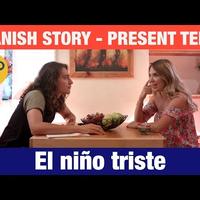Spanish Story | Present Tense | El niño triste
||||||sad
Spanische Geschichte | Präsens | Der traurige Junge
Spanish Story | Present Tense | The Sad Child
Іспанська історія | Теперішній час | Сумний хлопчик
Hola.
Hola.
Te voy a contar algo.
|||tell|
I'm going to tell you something.
¿Qué pasó?
|happened
What happened?
Imagínate esto. Estoy en el parque.
|||||park
Imagine this. I'm in the park.
¿En el parque?
Sí, en el parque. Y veo a un niño.
¿Qué ves?
|do you see
Siehst du?
A un niño.
Y el niño está triste.
Qué mal.
|bad
So schlecht.
y el niño llora y llora.
|||cries||cries
and the child cries and cries.
Yo tengo un helado.
|||ice cream
Ich habe ein Eis.
¿Qué tienes?
Was hast du?
Un helado.
An ice cream.
Y le doy mi helado al niño.
||give||||
And I give my ice cream to the boy.
y el niño
se pone feliz.
|gets|
wird glücklich
he is happy.
Qué bien.
Y sonríe.
|smiles
And smile.
Pero el niño ya no tiene helado
|||already|||
Aber das Kind hat kein Eis mehr
But the boy no longer has ice cream
y está triste.
¿Y qué hace el niño?
Und was macht das Kind?
And what does the child do?
Llora y llora.
Qué mal.
Y yo
tengo un chocolate.
||chocolate
¿Qué tienes?
Un chocolate.
Y le doy mi chocolate al niño.
And I give my chocolate to the boy.
Y el niño está feliz
y sonríe.
Qué bien.
Y luego el niño ya no tiene chocolate
|then||||||
And then the boy no longer has chocolate
y está triste.
¿Y qué hace el niño?
And what does the child do?
Llora y llora.
Qué mal.
pero yo tengo unas uvas.
||||grapes
but I have some grapes.
¿Tienes unas uvas?
Sí.
Y le doy mis uvas al niño.
y el niño está feliz.
¡Qué bien!
How good!
Pero el niño ya no tiene uvas.
Aber der Junge hat keine Trauben mehr.
Mais le garçon n'a plus de raisins.
Y el niño está triste.
¿Y qué hace el niño?
Llora y llora.
Crying||
Y yo ya no tengo helado.
And I don't have ice cream anymore.
Ya no tengo chocolate.
Y ya no tengo uvas.
¿Y qué pasó?
Al final, el niño ve a su papá
|the end||||||
Am Ende sieht der Junge seinen Vater
In the end, the boy sees his dad
y se pone feliz.
and he is happy.
Qué bien.
Y se va con su papá.
Und er geht mit seinem Vater.
And he goes with his dad.
Qué bueno por el niño.
Yo también tengo algo que contarte...
|||||to tell you
Ich habe dir auch etwas zu sagen ...
I also have something to tell you ...

